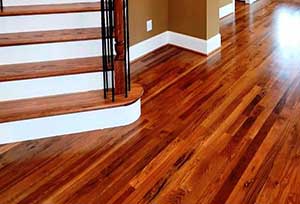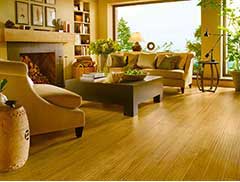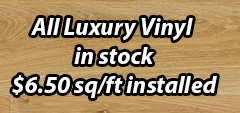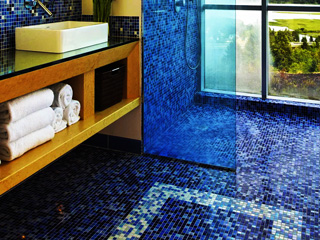 Bathroom flooring materials are available in seemingly endless options. Surprisingly most common flooring materials can be used for bathroom floors. Vinyl, tile, cork, hardwood, engineered wood, bamboo, laminate & stone are all suitable for bathrooms. The most common bathroom flooring is tile & vinyl due to their being waterproof. All these materials are pretty easy to maintain.
Bathroom flooring materials are available in seemingly endless options. Surprisingly most common flooring materials can be used for bathroom floors. Vinyl, tile, cork, hardwood, engineered wood, bamboo, laminate & stone are all suitable for bathrooms. The most common bathroom flooring is tile & vinyl due to their being waterproof. All these materials are pretty easy to maintain.
Having a water resistant to waterproof surface & keeping the subfloor free from moisture is a main concern for bathroom flooring. Keep in mind when shopping that flooring labeled as waterproof is completely impervious to water. Materials labeled as water resistant can resist water to some extent but aren’t entirely waterproof.
Though some materials may not be waterproof as is tile & luxury vinyl, other materials can be sealed with a polyurethane clearcoat to protect from moisture. Without sealing, seams in flooring tiles or planks should still be grouted, caulked or carefully installed tightly together to keep the seems from letting water through. Moisture getting beneath the flooring material could compromise it’s adhesion to the subfloor, rot the subfloor or create mold.
But properly installed bathroom flooring can last many years. In our home we have original tile in our bathrooms which is 40 years old and still in good shape.
Tile: The Waterproof Champion
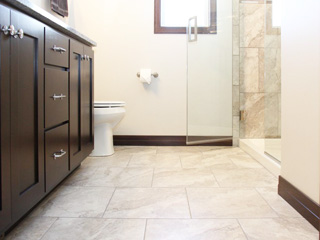 Tiles are among the most waterproof flooring materials available. Waterproof tile materials like ceramic, porcelain and glass are the ideal choice for bathroom flooring. Tiles have long been the gold standard for bathroom flooring, known for their durability and timeless aesthetic appeal. They remain the most common choices among homeowners and designers alike.
Tiles are among the most waterproof flooring materials available. Waterproof tile materials like ceramic, porcelain and glass are the ideal choice for bathroom flooring. Tiles have long been the gold standard for bathroom flooring, known for their durability and timeless aesthetic appeal. They remain the most common choices among homeowners and designers alike.
Tiles are easy to clean and maintain. Grout lines may require periodic attention, but overall, tile flooring is relatively low-maintenance. Tile flooring, particularly porcelain, may be more costly than other materials, but since bathrooms are usually not alot of square footage the price difference may not be too much.
Luxury Vinyl: The Waterproof Workhorse
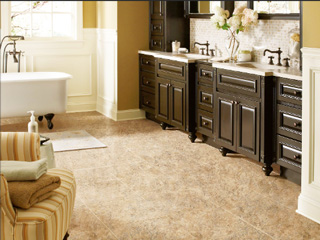 Vinyl flooring, made from PVC, is a synthetic plastic known for being waterproof. Along with tile, it’s a top most common choice for bathroom flooring. While generally more affordable, vinyl flooring, particularly luxury vinyl (thick, high quality vinyl) is available in limitless styles and can look just like real wood, tile or stone. And it comes in sheets, tiles and planks.
Vinyl flooring, made from PVC, is a synthetic plastic known for being waterproof. Along with tile, it’s a top most common choice for bathroom flooring. While generally more affordable, vinyl flooring, particularly luxury vinyl (thick, high quality vinyl) is available in limitless styles and can look just like real wood, tile or stone. And it comes in sheets, tiles and planks.
It’s easy for a homeowner to install and is available in glue down, peel and stick, or click together. Sheet vinyl is particularly ideal as it’s a seamless single piece of vinyl installed over the subfloor. This eliminates the possibility of water getting through seams. Sheet vinyl however is more of a job for professional installers. Another advantage of vinyl is it’s softer & warmer to walk on than tile which can get cold.
Cork: Natural and Moisture-Resistant
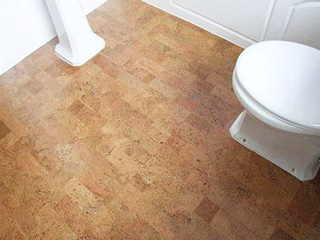 Cork is naturally resistant to water and moisture. While not entirely waterproof, cork can withstand occasional spills and splashes in the bathroom. Still proper sealing is essential to protect cork flooring from water damage. Cork flooring is an eco friendly, sustainable flooring option for bathroom flooring. Like vinyl it also offers the comfort of warmth and softness.
Cork is naturally resistant to water and moisture. While not entirely waterproof, cork can withstand occasional spills and splashes in the bathroom. Still proper sealing is essential to protect cork flooring from water damage. Cork flooring is an eco friendly, sustainable flooring option for bathroom flooring. Like vinyl it also offers the comfort of warmth and softness.
Hardwood: Elegance With The Need for Sealing
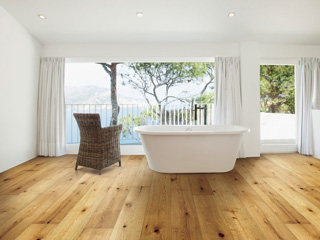 Hardwood offers timeless beauty and elegance. However it’s not naturally waterproof and requires a polyurethane clearcoat for moisture protection. With proper sealing hardwood can last many years and give warmth and charm to your bathroom. Hardwood has the unique advantage of being able to refinish & restore it’s appearance or even change the color. Hardwood flooring is not as common in bathrooms as tile & vinyl but hardwood is a top choice overall for it’s natural appeal.
Hardwood offers timeless beauty and elegance. However it’s not naturally waterproof and requires a polyurethane clearcoat for moisture protection. With proper sealing hardwood can last many years and give warmth and charm to your bathroom. Hardwood has the unique advantage of being able to refinish & restore it’s appearance or even change the color. Hardwood flooring is not as common in bathrooms as tile & vinyl but hardwood is a top choice overall for it’s natural appeal.
Engineered Wood: Wood With Enhanced Water Resistance
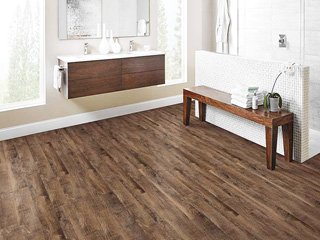 Engineered wood is more water-resistant than hardwood. It is made with a plywood base and a solid hardwood veneer (top layer). The plywood base is treated with a moisture-resistant resin, which makes it less likely to warp or buckle when exposed to water or humidity.
Engineered wood is more water-resistant than hardwood. It is made with a plywood base and a solid hardwood veneer (top layer). The plywood base is treated with a moisture-resistant resin, which makes it less likely to warp or buckle when exposed to water or humidity.
Like hardwood, engineered wood can be sanded and refinished (though not as many times), extending its lifespan and allowing you to change the look of your bathroom without a complete flooring replacement.
Engineered wood is available in prefinished or unfinished planks. With prefinished you can see exactly how the finish looks before installing. With unfinished the wood will be finished during installation. An extra plank can be used to sample stains before installation. The main advantage of finishing the floor during installation is that the seams will be sealed giving more protection to the floor.
Floating Bathroom Floors
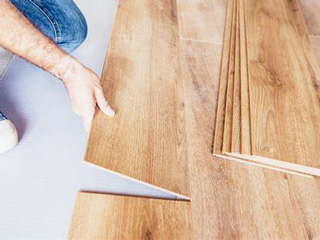 Wood floors, either solid hardwood or engineered wood are nailed, stapled or glued down but are also available as locking tongue and groove planks. This creates a ‘floating floor’, meaning it’s unattached to the subfloor. This type of installation is easiest for a do it yourself installation. When a floating floor is installed on a concrete ground floor a moisture barrier is sometimes also used. This is a waterproof plastic sheet underlayment which protects the flooring material from any moisture that may arise from the ground through the concrete. Most flooring materials except ceramic and porcelain or stone can be installed as a floating floor with click lock or tongue and groove tiles & planks.
Wood floors, either solid hardwood or engineered wood are nailed, stapled or glued down but are also available as locking tongue and groove planks. This creates a ‘floating floor’, meaning it’s unattached to the subfloor. This type of installation is easiest for a do it yourself installation. When a floating floor is installed on a concrete ground floor a moisture barrier is sometimes also used. This is a waterproof plastic sheet underlayment which protects the flooring material from any moisture that may arise from the ground through the concrete. Most flooring materials except ceramic and porcelain or stone can be installed as a floating floor with click lock or tongue and groove tiles & planks.
Bamboo Bathroom Flooring: Natural Resilience
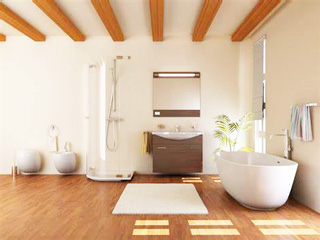 Bamboo is another sustainable & eco friendly material naturally resistant to water and moisture. Like hardwood, proper sealing is necessary to safeguard bamboo flooring from water damage. While bamboo has similar properties & appearance to wood, it’s actually a type of grass that grows very tall & fast, thus making it easier to replace & reproduce than harvesting wood.
Bamboo is another sustainable & eco friendly material naturally resistant to water and moisture. Like hardwood, proper sealing is necessary to safeguard bamboo flooring from water damage. While bamboo has similar properties & appearance to wood, it’s actually a type of grass that grows very tall & fast, thus making it easier to replace & reproduce than harvesting wood.
Bamboo can be refinished also like wood, though not as many times and it can’t be stained. However bamboo is very hard and resistant to dents and scratches so it requires refinishing less. Bamboo is generally less costly than hardwood, though most of it comes from China and it’s advisable to avoid el cheapo products. Lower quality products without quality certifications could be made with low quality adhesives that release VOC’s into the air, reducing air quality.
Laminate: Water-Resistant If High Quality
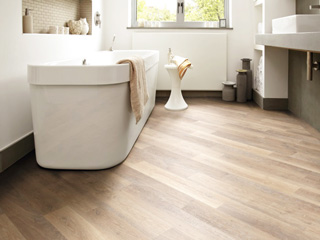 Laminate flooring is a product composed of several layers with a core of fiberboard and resins. The core is sandwiched between a plastic bottom and clear laminated top layer which protects a photographic layer that mimicks tile, wood or stone. Laminate flooring isn’t waterproof but can have a water-resistant core. Higher quality laminate is generally more water resistant.
Laminate flooring is a product composed of several layers with a core of fiberboard and resins. The core is sandwiched between a plastic bottom and clear laminated top layer which protects a photographic layer that mimicks tile, wood or stone. Laminate flooring isn’t waterproof but can have a water-resistant core. Higher quality laminate is generally more water resistant.
In years past laminate was often a flooring product that was cheap and not very long lasting. Today there are many quality laminate products which are made to last yet are still less costly than most other flooring options. Laminates affordability and ability to look like real wood, stone or tile make it a very popular choice overall.
As mentioned, though laminate cannot be refinished, it can be sealed with polyurethane. When the polyurethane coat wears it can be very carefully screened. Screening means a light sanding of the polyurethane that doesn’t touch the flooring material. Oversanding can damage the photographic layer with the image of tile, stone or wood. In this way the surface can be recoated with polyurethane to renew the finish. This is different than refinishing of wood which can be sanded deep enough to remove all dents and scratches.
Stone Bathroom Flooring: Requires Sealing
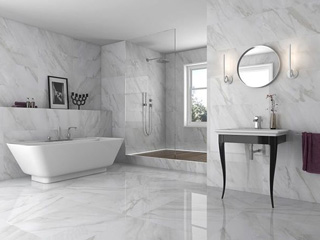 Last but not least we have stone. Stone flooring isn’t inherently waterproof and needs proper sealing. Similar to other natural materials, stone isn’t as waterproof as tile or vinyl. But properly sealed stone can last a lifetime, making it a long-term investment. Natural stone, such as marble or travertine, adds sophistication and luxury to your bathroom, creating a spa-like atmosphere.
Last but not least we have stone. Stone flooring isn’t inherently waterproof and needs proper sealing. Similar to other natural materials, stone isn’t as waterproof as tile or vinyl. But properly sealed stone can last a lifetime, making it a long-term investment. Natural stone, such as marble or travertine, adds sophistication and luxury to your bathroom, creating a spa-like atmosphere.
Conclusion
As we’ve mentioned, ceramic, porcelain and vinyl are the most popular bathroom flooring materials, yet most common flooring materials will also work well if properly installed and sealed. While some materials may benefit from a resealing or refinishing after years of use, occasional or regular sweeping or mopping is really all that’s needed for maintenance.
Your main consideration while shopping is your style. Budget is somewhat a consideration but much less than flooring for larger areas like bedrooms and living rooms. Also consider avoiding the cheapest products if you want a long lasting floor.
